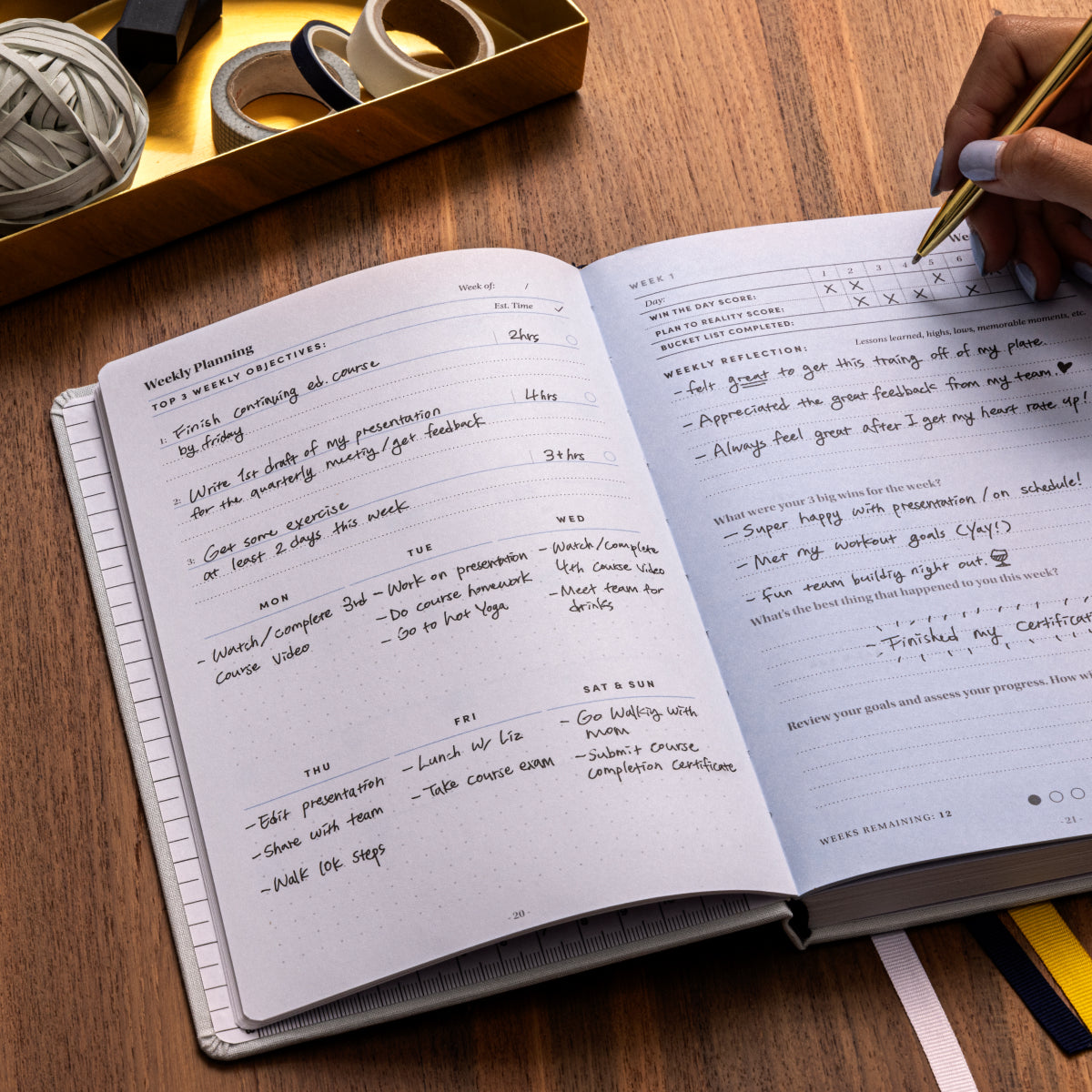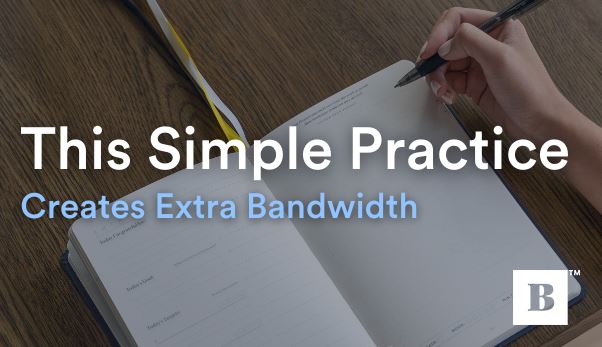Ever noticed that you can have all the answers to a really hard problem one minute, yet struggle to find your keys or remember what’s on your shopping list the next?
The human brain is amazing - unless we want to remember things!
Our memory simply isn’t reliable. It’s why we misremember details, forget key aspects, or even fill in the gaps by making things up! The uncertainty breeds chaos. It’s a problem because a scatterbrain isn’t a productive brain!
When you struggle to focus or you’re scrambling to remember things, you waste time. You end up running around in circles, faffing over small tasks, and struggling to make decisions. Sound familiar?
Fortunately, there’s a way to calm the chaos - become a note-taker! Be like Tim Ferriss and, “take notes like some people take drugs.” He’s not the only person who swears by his notebook and pen either. Become a dedicated note-taker and you’ll be in the company of people like Richard Branson, Bill Gates, and Sheryl Sandberg.
But why are notes so powerful? And how should you take them to boost your productivity. Keep reading to find out...
Great notes create an external brain
When you take notes, you benefit from information in a whole new way.
Whether that’s remembering more from the books you read, to prepping better for exams, to capturing some of the million and one ideas that flow through your head, turn thoughts into the written word and you don’t have to rely on your memory alone.
Instead, you’ve got a reliable external brain ready to help you recall and remember information whenever you want it. It’s a huge efficiency boost.
But it doesn’t stop there. As well as bypassing the need to memorize, notes help reduce mental clutter, which in turn boosts your productivity.
When your head’s full of everything from grocery shopping, to next week’s date night, to plans for your kid’s birthday party, is there any wonder you can’t think straight!
When you’re overloaded and overwhelmed, you feel stressed. You don’t have the mental capacity to make thoughtful decisions or create something new. Instead, you end up reacting and that can make you feel frazzled and out of control of your life.
But empty your head through notes and you free up the head space to think, plan, act, and create.
But what kind of notes should you take to get the maximum value from note-taking?
These are THREE of our favorites. Each will calm your scatterbrain, boost your productivity, and help you make more of the ideas you have.
1. Note down your to-do list
When you’re juggling a million jobs and responsibilities, your head soon gets full.
Noting down your to-do list is one of the simplest, and most effective ways to take back control and quit the frazzled thinking. With a written list of everything on your plate you don’t have to waste energy remembering and you don’t have to worry about forgetting anything either.
Make it a habit to get your to-do list out of your head and onto paper and you can focus on getting things done. It’s a simple note-taking strategy that calms your scatterbrain and makes you more productive.
We recommend you create a master to-do list for the week ahead on a Sunday. (Yup, Sunday can be your most productive day of the week!) Start with a brain dump - get everything you need to do written down (and we mean EVERYTHING). Tasks, meetings, key dates, shopping, decisions… empty your head so you can use that bandwidth for something more valuable.
But don’t stop with a list alone. Not all tasks are created equally and productivity isn’t just about the amount of things you get done. Instead, it’s about the quality of what you accomplish in the time you have.
So with your list written out, get to prioritizing. Be realistic with what you can get done with your time and and set yourself up for a win.
We LOVE the Weekly Action Pad for this.
Not only does it capture your weekly to-do list, it helps you prioritize and organize everything. When you plan your week to stay on top, you get to run your life - not the other way around.
2. Take notes from books
Good books are amazing. Read a book and you get an insight into the mind of the author. It’s a great way to learn and a great way to raise your awareness of a whole heap of new ideas and concepts.
But how often do you forget all the inspiring things you’ve read, even before you’ve finished the last page? Whether you’re reading for college, for self-improvement, or just for interest, a note-taking strategy can transform what you take away from the books you read.
These strategies will help:
• Read in chunks. Ever get to the point where you’re reading the words but nothing’s going in? Our brains can only focus fully for a certain length of time before we switch off. It’s why we recommend reading in chunks. So don’t force yourself to sit for hours on end. Instead, schedule in breaks - the Pomodoro technique is good for this. Read for 25 minutes then take a break for 5 minutes. Not only will your concentrate better, but you’ll be able to read for longer and you’ll probably remember more too.
• Set yourself a reading goal. You’ll get more from your reading if you know why you’ve picked up a book in the first place. Are you looking for something specific? What do you want to learn? Have an intention and you’ll be more focused as you read - something that will be reflected in your notes.
• Unless you’re jotting down quotes, write notes in your own words. Don’t copy what you read (or hear). Force yourself to write things in your own words and you’ll have to understand what you’ve read. It’s a powerful way to take more from your reading and deepen your own knowledge at the same time.
• Note down ideas - not just information. As well as notes that capture the concepts you’re reading about, remember to write down the ideas and insights the books sparks in you. Ideas are keys that unlock new doors. You never know where that game-changing idea is going to come from. Never miss a thing by writing them down when they flow.
• Keep your notes short and succinct. Notes don’t have to be long and length. You don’t have to write our concepts and ideas in full. Instead, use keywords and examples to trigger your memory. This will make your notes much more useful.
• Use an indexing system. to help you find information and ideas quickly. Notes can be a really useful external brain - but only if you’re able to find something again! An index can help you do this. This can be as simple as a contents list and page numbers in the front of your notebook.
• Create a code to use as a shorthand. Different colors or symbols are an easy way to cut down what you need to write down! So have a play with your pens and take more from your notes as a result.
3. Notes from your mind
Sometimes you’ll sit down with the intention to write notes.
Other times, an idea will hit you when you least expect it and if you don’t write it down, it’s gone.
Notes from your mind are some of the most valuable because they contain the sparks that could actually lead somewhere. A solution to a problem, an idea for a new product or a piece of content, a thought you want to explore with your kids, a new way of doing things, a new take on a situation - you name it… anything is possible.
Notes fuel creativity, which in Steve Job’s words is:
"Creativity is just connecting things. When you ask creative people how they did something, they feel a little guilty because they didn't really do it, they just saw something.”
So get in the habit of carrying a notebook everywhere so you’re always ready to capture the sparks as they show up. From an aha moment to an item for your shopping list to a date for your diary, get it all out of your head and make brain space for more.
The Scribe notebook is brilliant for this. Even better when paired with a tool such as the Thinking Time Deck. If your mind is blank or devoid of ideas, try prompting it with a question. Let your mind ponder and dig up some answers and suddenly the blank page is covered in gold!
You’ve got notes - what now?
Become a note-taker and you can look forward to more calm, less chaos, and a whole lot more productivity. With an uncluttered mind and more headspace to think, you can take back control and get more done.
But there’s a final step you can take to get even more from your notes.
Review them!
Don’t throw out your notebooks or shove them to the back of a cupboard. Instead, review your notes and decide how you’ll turn what you’ve written into action items. That way your notes become more than words in a book, they help transform your reality.








Leave a comment
This site is protected by reCAPTCHA and the Google Privacy Policy and Terms of Service apply.